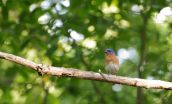Persist and shout: Male bluebirds alter songs to be heard over increased acoustic noise
UK and US research shows birds 'shout' to be heard over the noise produced by man-made activity
2015-08-21
(Press-News.org) Birds 'shout' to be heard over the noise produced by man-made activity, new research has shown.
The innovative study, led by an expert from the University of Exeter, looked at how bluebirds altered their songs in response to increases in nearby background noise caused, in many cases, by human activities such as traffic.
It found that the birds altered their songs immediately after noise levels intensified, making 'real-time' adjustments in order to produce songs that are both louder and lower-pitched. The results suggest that birds are able to perceive increases in noise and respond accordingly - not unlike humans do when in raucous settings.
Dr Caitlin Kight, a behavioural ecologist based at the University of Exeter's Penryn Campus in Cornwall, led the study. Dr Kight said that the research could help improve our understanding of environmental constraints on animal communication, as well as enhance our awareness of what sorts of human modifications can impact animals, and how we might be able to reduce any negative effects of these disturbances.
Dr Kight said: "Although many manmade noise regimes are often very different from those found in nature, there can be surprising similarities in certain features, including volume, pitch, or timing. Sounds caused by traffic, for example, may not be hugely different from those produced by waterfalls or heavy winds. Animals that evolved in habitats with those natural features may therefore already have, within their existing repertoires of behaviours, the flexibility to respond to noise pollution. This certainly seems to be the case with bluebirds."
Although it has previously been shown that birds in noisier areas tend to sing differently than those in quieter surrounds, it was not immediately clear whether birds were able to make vocal adjustments in real time - that is, an immediate shift in response to increased noise made by a passing car, for example. Real-time modifications have now been observed in five different avian species. The current study is the first to describe this behaviour in a member of the thrush family.
Dr Kight recorded songs produced by 32 male bluebirds, and analysed two from each male - those produced during the quietest and loudest period of ambient noise - to investigate whether males changes their songs between these two conditions.
She found that, as background noise increased, male bluebirds produced songs that were louder and lower-pitched. This suggests that the birds are able to both perceive and respond to increases in noise. This enabled them to produce songs that were more likely to be heard by potential mates or rivals.
Co-author Dr John Swaddle, from The College of William and Mary, in the United States, cautions against interpreting these findings as evidence that noise pollution has no adverse impacts on wild animals.
Dr Swaddle said: "Unfortunately, the world is getting so noisy that even the most flexible of species will eventually reach a threshold beyond which they will have difficulty communicating--which will impact their ability to breed successfully. When we build roads and airports near human neighbourhoods, we employ noise abatement protocols in an effort to mitigate against the negative impacts of noise pollution. It is time to apply similar caution to conservation, management, and landscaping plans that impact wildlife and their habitats."
INFORMATION:
The study, 'Eastern Bluebirds Alter their Song in Response to Anthropogenic Changes in the Acoustic Environment,' features in the leading scientific journal Integrative and Comparative Biology.
[Attachments] See images for this press release:

ELSE PRESS RELEASES FROM THIS DATE:
2015-08-21
Chestnut Hill, MA (Aug. 21, 2015) - A fresh look at some old rocks has solved a crucial mystery of the last Ice Age, yielding an important new finding that connects to the global retreat of glaciers caused by climate change today, according to a new study by a team of climate scientists.
For decades, researchers examining the glacial meltdown that ended 11,000 years ago took into account a number of contributing factors, particularly regional influences such as solar radiation, ice sheets and ocean currents.
But a reexamination of more than 1,000 previously studied ...
2015-08-21
CHICAGO -- Each year, 311 -- New York City's main hub for government information and non-emergency services -- receives millions of requests and complaints, including New Yorkers' gripes about their neighbors.
In a new study from New York University (NYU) using 311 complaint data, researchers tracked when and where New Yorkers complain about their neighbors making noise, blocking driveways, or drinking in public. They found that these complaints -- a defining aspect of urban life -- are more likely to occur in areas sandwiched between two homogenous communities, where ...
2015-08-21
A former adviser to the US Secretary of State says that genetic modification (GM) is the most critical technology in agriculture for meeting the challenges of feeding a growing global population, writing in the open access journal Agriculture & Food Security.
Nina Fedoroff, molecular biologist and former Science and Technology Adviser to Hillary Clinton and Condoleezza Rice, warns of the detrimental influence of politics and misinformation on the safety of GM crops. Instead, Fedoroff says that: "GM crops are arguably the safest new crops ever introduced into the human ...
2015-08-21
The fact that the greatest diversity of large mammals is found in Africa reflects past human activities - and not climatic or other environmental constraints. This is determined in a new study, which presents what the world map of mammals would look like if modern man (Homo sapiens) had never existed.
In a world without humans, most of northern Europe would probably now be home to not only wolves, Eurasian elk (moose) and bears, but also animals such as elephants and rhinoceroses.
This is demonstrated in a new study conducted by researchers from Aarhus University, Denmark. ...
2015-08-21
In a new study published today in the Journal of Health Psychology, researchers from the University of Surrey have found dieters who eat 'on the go' may increase their food intake later in the day which could lead to weight gain and obesity. The findings from the study also showed that eating while walking around triggered more overeating compared to eating during other forms of distraction such as watching TV or having a conversation with a friend.
The team examined 60 females who were either dieters or non-dieters and gave them all a cereal bar to eat under three different ...
2015-08-21
A "substantial" proportion of NHS hospital staff--around one in eight, in some places--treat the victims of people trafficking, with maternity services most likely to do so, finds research published in the online journal BMJ Open.
Although understanding of the sorts of health problems trafficked patients are likely to have, is generally high, few NHS staff feel adequately prepared to respond appropriately, the findings suggest.
International law requires that the UK provides victims of human trafficking with whatever medical treatment they require, which includes psychological ...
2015-08-21
Nine potentially modifiable risk factors may contribute to up to two thirds of Alzheimer's disease cases worldwide, suggests an analysis of the available evidence, published online in the Journal of Neurology Neurosurgery & Psychiatry.
The analysis indicates the complexity of Alzheimer's disease development and just how varied the risk factors for it are.
But the researchers suggest that preventive strategies, targeting diet, drugs, body chemistry, mental health, pre-existing disease, and lifestyle may help to stave off dementia. This could be particularly important, ...
2015-08-21
In a Policy View published in The Lancet Neurology journal, a group of leading experts on the epidemiology of dementia state that the number of people with dementia - both new cases and total numbers with the disease - in some Western European countries is stabilising despite population ageing, in direct contrast to the "dementia epidemic" reported in some recent studies.
The Policy View discusses data from five large epidemiological studies done in Sweden, the Netherlands, the UK, and Spain that compare dementia occurrence in old people across two periods of time using ...
2015-08-21
Highlights
Among kidney transplant recipients, patients with mostly IgG3 donor-specific HLA antibodies had a higher likelihood of organ rejection soon after transplantation.
If rejection occurred in those with mostly IgG4 antibodies, it was usually much later after transplantation.
Washington, DC (August 20, 2015) -- The dominant antibody type present in the blood of transplant recipients may indicate their likelihood of experiencing organ rejection, according to a study appearing in an upcoming issue of the Journal of the American Society of Nephrology (JASN). ...
2015-08-20
DALLAS, Aug. 20, 2015 -- Caregiver spouses of stroke survivors are at an increased risk of mental and physical health issues that may continue for years, according to research in the American Heart Association journal Stroke.
Swedish researchers evaluated 248 stroke survivors, below age 70 (average mid-sixties), and their spouses at stroke onset and compared the results with 245 non-stroke controls for seven years after the stroke event.
At the seven-year follow-up, 16.5 percent of survivors had suffered a recurrent stroke. Spouses of survivors reported lower scores ...
LAST 30 PRESS RELEASES:
[Press-News.org] Persist and shout: Male bluebirds alter songs to be heard over increased acoustic noise
UK and US research shows birds 'shout' to be heard over the noise produced by man-made activity


